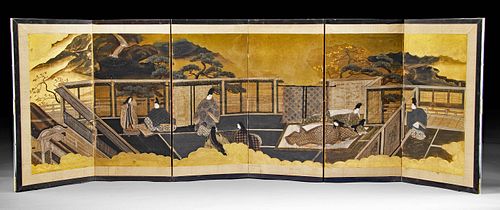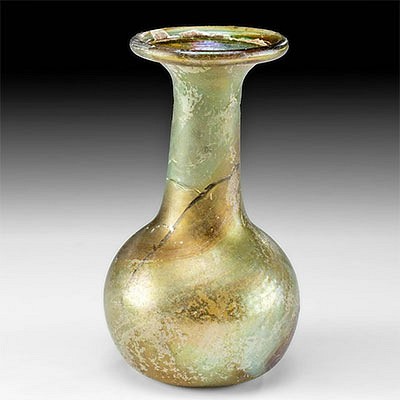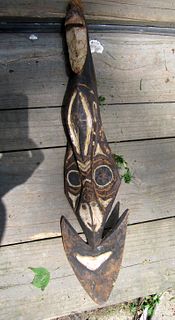Japanese Meiji Period Folding Screen - Tale of Genji
Lot 27c
About Seller
Artemis Gallery
686 S Taylor Ave, Ste 106
Louisville, CO 80027
United States
Selling antiquities, ancient and ethnographic art online since 1993, Artemis Gallery specializes in Classical Antiquities (Egyptian, Greek, Roman, Near Eastern), Asian, Pre-Columbian, African / Tribal / Oceanographic art. Our extensive inventory includes pottery, stone, metal, wood, glass and textil...Read more
Categories
Estimate:
$1,500 - $2,250
Absentee vs Live bid
Two ways to bid:
- Leave a max absentee bid and the platform will bid on your behalf up to your maximum bid during the live auction.
- Bid live during the auction and your bids will be submitted real-time to the auctioneer.
Bid Increments
| Price | Bid Increment |
|---|---|
| $0 | $25 |
| $300 | $50 |
| $1,000 | $100 |
| $2,000 | $250 |
| $5,000 | $500 |
| $10,000 | $1,000 |
| $20,000 | $2,500 |
| $50,000 | $5,000 |
| $100,000 | $10,000 |
| $200,000 | $20,000 |
About Auction
By Artemis Gallery
Jun 24, 2021
Set Reminder
2021-06-24 10:00:00
2021-06-24 10:00:00
America/New_York
Bidsquare
Bidsquare : VARIETY SALE | Ancient & Ethnographic Art
https://www.bidsquare.com/auctions/artemis-gallery/variety-sale-ancient-ethnographic-art-7119
Featuring classical antiquities, ancient and ethnographic art. Egyptian, Greek, Roman, Etruscan, Near Eastern, Asian, Pre-Columbian, Native American, African / Tribal, Oceanic, Spanish Colonial, Russian, Fossils, Fine Art, more! All legally acquired, legal to sell. Satisfaction guaranteed. Artemis Gallery info@artemisgallery.com
Featuring classical antiquities, ancient and ethnographic art. Egyptian, Greek, Roman, Etruscan, Near Eastern, Asian, Pre-Columbian, Native American, African / Tribal, Oceanic, Spanish Colonial, Russian, Fossils, Fine Art, more! All legally acquired, legal to sell. Satisfaction guaranteed. Artemis Gallery info@artemisgallery.com
- Lot Description
East Asia, Japan, Meiji period, ca. 1868 to 1912 CE. A stunning Japanese Meiji period six-panel folding screen expertly painted on rice paper to depict scenes from the Tale of Genji, written by the famous lady-in-waiting Murasaki Shikibu, with characteristic bird's eye views of the interiors and a beautiful landscape beyond. This classic romantic work of Japanese literature, written in the 11th century, paints a wonderful portrait of courtly life in medieval Japan and is widely touted to be the world's first novel. The story tells of the passionate prince Genji's love affairs and political escapades. The painting is set in a black lacquer frame, has a golden silk brocade border, and closes neatly along its accordion folds. Size open: 73" W x 24.75" H (185.4 cm x 62.9 cm) Size closed: 4.2" L x 12.625" W x 24.75" H (10.7 cm x 32.1 cm x 62.9 cm)
The Tale of Genji was first illustrated in scroll form with text narrating select images. Murasaki Skikibu paid much attention to the emotions and pure beauty in her novel. The Japanese term for this is "mono no aware" - meaning an appreciation and longing for the ephemeral moments of joy, beauty, and heartbreak that are part of the human existence. These ideas are conveyed in subtle ways in this screen painting. For example, notice how the lovers' heads are gently bowed toward one another on the left of this composition. In this way, the artist was gently communicating the couples' mutual interest and affection.
Provenance: private Evergreen, Colorado, collection, USA; ex-private Denver, Colorado, USA, collection; acquired 1960 to 2000
All items legal to buy/sell under U.S. Statute covering cultural patrimony Code 2600, CHAPTER 14, and are guaranteed to be as described or your money back.
A Certificate of Authenticity will accompany all winning bids.
We ship worldwide and handle all shipping in-house for your convenience.
#163064Minor scuffs to pigmentation here and there and a few small punctures as shown, but overall the imagery is very strong. Slight stains to brocade border. Minor losses and stains to paper covering sides of panels (mostly hidden when screen is open). A few scuffs and nicks/chips to the black lacquer frame, but the frame is otherwise very good and closes neatly along accordion folds. Patterned paper on verso is also well preserved save expected toning and a minute stains.Condition
- Shipping Info
-
All shipping is handled in-house for your convenience. Your invoice from Artemis Gallery will include shipping calculation instructions. If in doubt, please inquire BEFORE bidding for estimated shipping costs for individual items.
-
- Buyer's Premium



 EUR
EUR CAD
CAD AUD
AUD GBP
GBP MXN
MXN HKD
HKD CNY
CNY MYR
MYR SEK
SEK SGD
SGD CHF
CHF THB
THB















